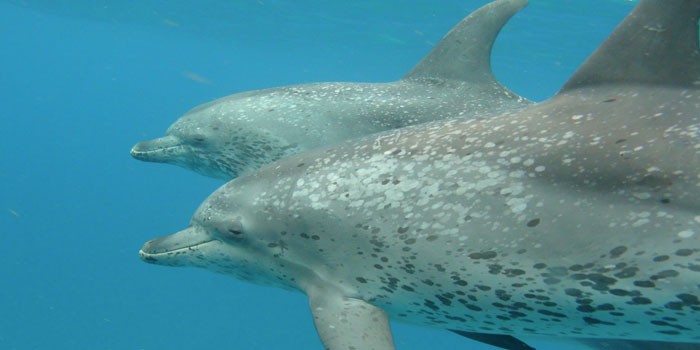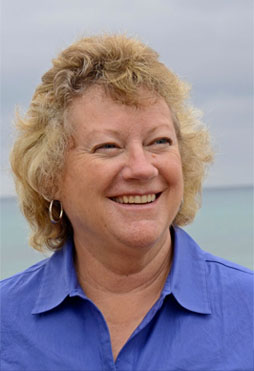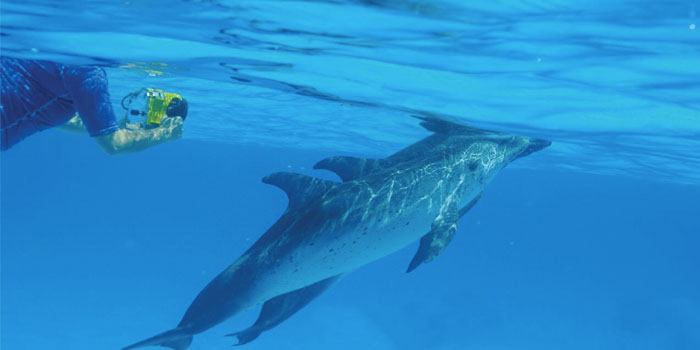Driftwood Plaza
- (561) 745-7772
- email us
- Jupiter, Florida, United States


JUPITER, FL – December 27, 2017 – Who lives in a pod under the sea? Dolphin species. Although we may not look alike, what you may not know about these mammals is that they are very similar to humans. The way they act, the way they fight, the hierarchy of their families, and how their underwater society thrives. Founder and Research Director of the Wild Dolphin Project (WDP), Dr. Denise Herzing, has dedicated her life to understanding the livelihood of dolphins with a unique method, and to also educate the population on the many incredible aspects that the species possesses, all while spreading the word on ocean conservation.
As the only branch of WDP is located in Jupiter, we had the opportunity to sit down with Herzing herself to acquire her knowledge of dolphins and to share her mission and vision of the research organization that has been around for the past 33 years.
“My mission is to tell the story of the wild dolphins, including their behaviors, social structure, communication, and habitat. The vision is to scientifically understand those elements by tracking individuals and their society to share with the world,” states Herzing.

Dr. Denise Herzing, founder and research director of the Wild Dolphin Project
Becoming fascinated with dolphins from a young age, Herzing began her education at Oregon State where she received a bachelor’s degree in Marine Biology. She then continued to deepen her knowledge at San Francisco State where she earned her master’s in Marine Zoology and Behavioral Biology.
In 1985, she began her research in the Bahamas while still in school, spending her summers commuting back and forth to Jupiter with one goal in mind: To create an entity that would encapsulate her passion for dolphins and create awareness, continue her research, and raise funds to protect the species.
Putting her dreams into action, once she graduated from San Francisco State in 1988 she moved to Jupiter due to the benefits that our oceanside town reaped. Conveniently located only 60 miles off the coast of the Bahamas, Jupiter was the ideal place for Dr. Herzing to live while performing her research in the islands. It was then that the single branch of the WDP came to fruition.

Dr. Herzing utilizes a “hands- off” method tracking the dolphins using photography and video.
“The reason I chose the Bahamas is that it is one of the only places in the world that you can see clearly under the water. In most places in the world, you have to study at the surface,” explains Herzing.
Her research from the coast of Jupiter to the Bahamas consists of tracking the Atlantic spotted dolphins and bottlenose dolphins via photo identification rather than tagging with trackers because she believes in a unique, non-invasive approach. This means to study the two communities with a “hands-off” method in order to gain the trust of the animals, which has allowed her and other researchers to observe and document them in their natural habitat.
Methodically tracking the animals, she is able to study their reproductive and health states, social associations, as well as conduct underwater videos and sound work to try to decode their language by correlating the sounds with behavior. Through collecting fecal samples, they are able to extract DNA to analyze and understand paternity, relationships, and potential hybridization between both species.
Each season the two communities are re-identified due to climate changes that can affect migration patterns. The WDP makes it a priority to monitor the habitat and distribution changes of the dolphins’ environments while exploring oceanographic features that can influence them to move.
In order to educate the public, Herzing and researchers from WDP attend and present at local, national, and international conferences and schools. Their research has been published in multiple local and national scientific publications such as National Geographic, as well as a few documentaries by PBS. The most recent being “Dolphins: Breaking The Code,” a forthcoming episode of the Changing Seas series–an original production by South Florida PBS. This episode will premiere during, “Wild Ocean Science”, WDP’s 1st annual event being held on March 24th, 2018, at FAU’s Jupiter campus auditorium at the Lifelong Learning Center.
For those who are looking to get involved, the WDP offers internships, volunteer opportunities, and memberships that include newsletters and summer field trip for individuals to observe dolphin behavior in their natural habitat. If you are not local to the Jupiter area, the organization accepts donations for research via their website.
“We need to know about our natural world and the critters that are in it,” expresses Herzing. “The ocean tells us so much about the health of our planet and we need to protect what we love in order to survive.”
» For more information on The Wild Dolphin Project, go to www.wilddolphinproject.org

Environmental Conservation Organizations
Jupiter, Florida, United States |
5615755660,
email us